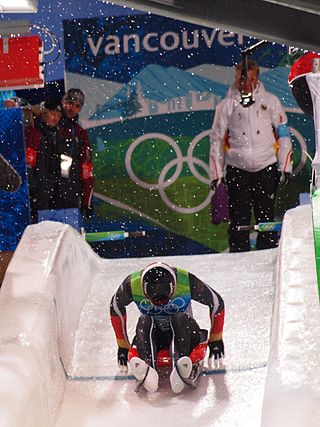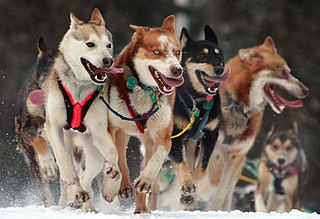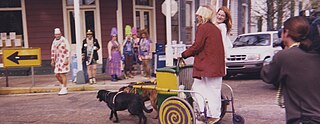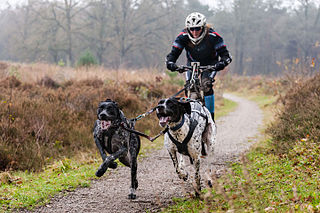
The Siberian Husky is a medium-sized working sled dog breed. The breed belongs to the Spitz genetic family. It is recognizable by its thickly furred double coat, erect triangular ears, and distinctive markings, and is smaller than the similar-looking Alaskan Malamute.

A luge is a small one- or two-person sled on which one sleds supine (face-up) and feet-first. A luger begins seated, propelling themselves initially from handles on either side of the start ramp, then steers by using the calf muscles to flex the sled's runners or by exerting opposite shoulder pressure to the pod. Racing sleds weigh 21–25 kg (46–55 lb) for singles and 25–30 kg (55–66 lb) for doubles. Luge is also the name of an Olympic sport that employs that sled and technique.

Skeleton is a winter sliding sport in which a person rides a small sled, known as a skeleton bobsled, down a frozen track while lying face down and head-first. The sport and the sled may have been named from the bony appearance of the sled.

A sled dog is a dog trained and used to pull a land vehicle in harness, most commonly a sled over snow.

Sled dog racing is a winter dog sport most popular in the Arctic regions of the United States, Canada, Russia, Greenland and some European countries. It involves the timed competition of teams of sled dogs that pull a sled with the dog driver or musher standing on the runners. The team completing the marked course in the least time is judged the winner.

Balto was an Alaskan husky and sled dog belonging to musher and breeder Leonhard Seppala. He achieved fame when he led a team of sled dogs driven by Gunnar Kaasen on the final leg of the 1925 serum run to Nome, in which diphtheria antitoxin was transported from Anchorage, Alaska, to Nenana, Alaska, by train and then to Nome by dog sled to combat an outbreak of the disease.

Mushing is a sport or transport method powered by dogs. It includes carting, pulka, dog scootering, sled dog racing, skijoring, freighting, and weight pulling. More specifically, it implies the use of one or more dogs to pull a sled, most commonly a specialized type of dog sled on snow, or a rig on dry land.

A Eurohound is a type of dog bred for sled dog racing. The eurohound is crossbred from the Alaskan husky and any of a number of pointing breeds ("pointers"), but most often the German Shorthair Pointer,

Carting is a dog sport or activity in which a dog pulls a dogcart filled with supplies, such as farm goods, camping equipment, groceries or firewood, but sometimes pulling people. Carting as a sport is also known as dryland mushing and is practiced all around the world, often to keep winter sled dogs in competition form during the off-season.

Togo was the lead sled dog of musher Leonhard Seppala and his dog sled team in the 1925 serum run to Nome across central and northern Alaska. Despite covering a far greater distance than any other lead dogs on the run, over some of the most dangerous parts of the trail, his role was left out of contemporary news of the event at the time, in favor of the lead dog for the last leg of the relay, Balto, whom Seppala also owned and had bred.

Skijoring is a winter sport in which a person on skis is pulled by a horse, a dog, another animal, or a motor vehicle. The name is derived from the Norwegian word skikjøring, meaning "ski driving". Although skijoring is said to have originated as a mode of winter travel, it is currently primarily a competitive sport.

The International Dragon Boat Federation is the international governing body for the sport of dragon boat racing. IDBF was founded in Hong Kong on June 24, 1991 by Australia, China, Taiwan, Great Britain, Hong Kong, Indonesia, Italy, Malaysia, Norway, the Philippines, Singapore, and the United States. IDBF currently has 75 member countries or territories and is supported by five continental federations.

Canicross is the sport of cross country running with dogs. Originating in Europe as off-season training for the mushing (sledding) community, it has become popular as a stand-alone sport all over Europe, especially in the UK, and the United States.

The Greyster is a type of sled dog bred for sled dog racing, especially dryland sports like canicross and bikejoring. The greyster is crossbred from the Greyhound and the German Shorthair Pointer.

The Jamaica Dogsled Team is a team of sled dogs and mushers headquartered at Chukka Caribbean Adventures in Ocho Rios, located in Saint Ann Parish, Jamaica. The dog team is made up of strays rescued by the Jamaica Society for the Prevention of Cruelty to Animals and offers dryland dogsled rides, along with the adventure center's other outdoor experiences. In addition, the two mushers Newton Marshall and Damion Robb, compete in sled races throughout the US and Canada, using leased dog teams. Country music singer Jimmy Buffett's Margaritaville is the team's major sponsor.
Mel Andrews is a British adventurer and athlete, specializing as a Musher in Dogsled Racing. On 5 February 2013, she became the first British woman to finish Europe's biggest sled dog race, Femundløpet. A month later Andrews broke the record for fastest GB rookie to finish the World's longest 8-dog race Finnmarksløpet.
The Northern Manitoba Trappers’ Festival is an annual winter festival held in February in The Pas, Manitoba, Canada. It is Manitoba’s oldest festival and one of Canada’s oldest winter festivals. The festival celebrates a wide variety of skills and activities that were, and in many cases still are, a matter of survival for life in Northern Canada, including ice fishing, muskrat skinning, tea boiling, bannock baking, and chain saw events. The highlight of the festival is the sled dog race, known as the World Championship Dog Race.
Kati Dagenais is a musher, an athlete in sled-dog racing. In 2009 she won the title of world champion in sled-dog racing in the 4-dog and 6-dog categories. In 2013 she won the world championship in 8-dog racing.
The IFSS On-Snow World Championships are a biannual sled dog racing event organized by the International Federation of Sleddog Sports (IFSS). The On-Snow World Championships was started in 1990 and was first hosted in St. Moritz, Switzerland.















